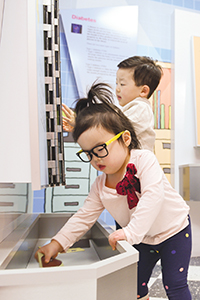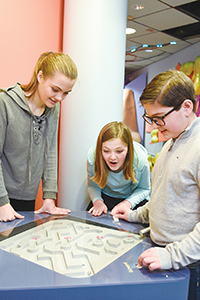The interactive science center gets a refresh at St. Joseph Mercy Canton Health Center
By PATRICIA CORRIGAN
Health, safety, and physical, emotional and social well-being — those are the goals of the St. Joseph Mercy Health Exploration Station in Canton, Michigan. The interactive health education center is celebrating 20 years of helping students learn about the human body while having fun.

Kids who visit can climb through a model of an ear, learn from an outsized plastic nose just how far a sneeze travels and pretend to be a piece of food sliding through a model of the digestive system. They also can unzip a 5-foot-tall fabric doll's chest and pull out assorted organs to examine. The doll, named "Stuffie," sports blue hair and a big smile, and it's one of the most popular exhibits.
Older students may study how smoking affects the lungs, learn about auto safety, simulate a brain operation or play with a marble maze that highlights the importance of making safe choices.
The Health Exploration Station also sponsors parent education programs. At "Drugs 101," parents visit a mock bedroom with 70 examples of drug paraphernalia and common items used to hide drugs. Another popular program is "Vaping 101," featured in the April 15, 2019, issue of Catholic Health World.
"This work is a passion for me," says Cheryl Phillips, the longtime program coordinator who also helped design the exhibits. "In Michigan's schools, health education is not a required course, and I think anything we can do to advocate for it is beneficial."
Field trip favorite
The museum and two classrooms that make up the Health Exploration Station fill 3,500 square feet on the lower level of St. Joseph Mercy Canton Health Center, an outpatient facility that is part of the Saint Joseph Mercy Health System. The health center funds the museum, which is open five days a week. Visitors pay a $4 admission fee.
For the museum's 20th anniversary, St. Joseph Mercy made major upgrades of several exhibits and completely overhauled others. "We've revamped the nutrition area, making it interactive," says Phillips. "Now we have puzzle pieces for the different food groups and kids can choose from a variety of options to put together a healthy plate. Also, some of our programs were running on older software, and we've updated them."
Phillips, who has a master's degree in education and previously taught middle school, says teachers from across southeastern Michigan bring preschoolers, elementary and middle school students and high school students to the center on field trips. "Elementary students are our primary audience, but everybody comes here," she says. "We see teachers from public schools and private schools from communities in a one-hour radius from Canton. We also welcome home-schooled students and students with special needs."
Dental and mental hygiene
In addition to the interactive exhibits in the museum, 20 different health education programs are available in the classrooms. "The younger kids can learn about how the body works or the importance of hand-washing or brushing teeth," Phillips says. "The upper elementary students see programs on how our organs function. Older students also learn about the body and about substance abuse prevention. The teachers select the programs."

Karen Kliber, a kindergarten teacher at St. Anselm Catholic School in nearby Dearborn Heights, Michigan, has taken students to the Exploration Station since it first opened. "It's a phenomenal place, and the kids all love it," Kliber says. "We have a sophisticated kindergarten program at St. Anselm. When we get into a topic, we don't just skim over it — we really get into it. Field trips to the museum are part of that."
Phillips also gives presentations outside the museum. "The Health Exploration Station comes to us," says Randy Root, executive director of the Huron Valley Community Coalition, an organization focused on reducing substance abuse. "Over the past three or four years, they've come many times to share programs with our community. Parents especially appreciate 'Drugs 101,' which covers everything they need to know and is presented in terms they can digest. The data is important, but parents also seem to value the tips on how to talk to kids about drug and alcohol abuse."
Root's organization also presents "Vaping 101" at assemblies for middle school students. That's none too early — Phillips reports that half a million middle school students in the U.S. are using e-cigarettes. "Cheryl's presentation includes skits, which lighten the mood, and she and her co-worker Gretchen Nachazel always hit it out of the park with the kids," Root says. "They pay attention and they learn something."
A trip down the alimentary canal
Adults and some students — even the younger ones — often provide feedback for Phillips. "One of the most fun parts of the job is to see the thank-you notes and drawings the kids send," she says. "They tell us they liked listening to their heartbeat or what they learned about food as it moved through the body." Parents contact her, too. "One mom wrote to say that after her son saw here what smoking does to lungs, he came home and asked her to stop."
Phillips' commitment to health education is affirmed every day at work. "What I love best about what I do is seeing the expressions on the kids' faces when they learn something new," she says. "That is the most rewarding part of my job."
